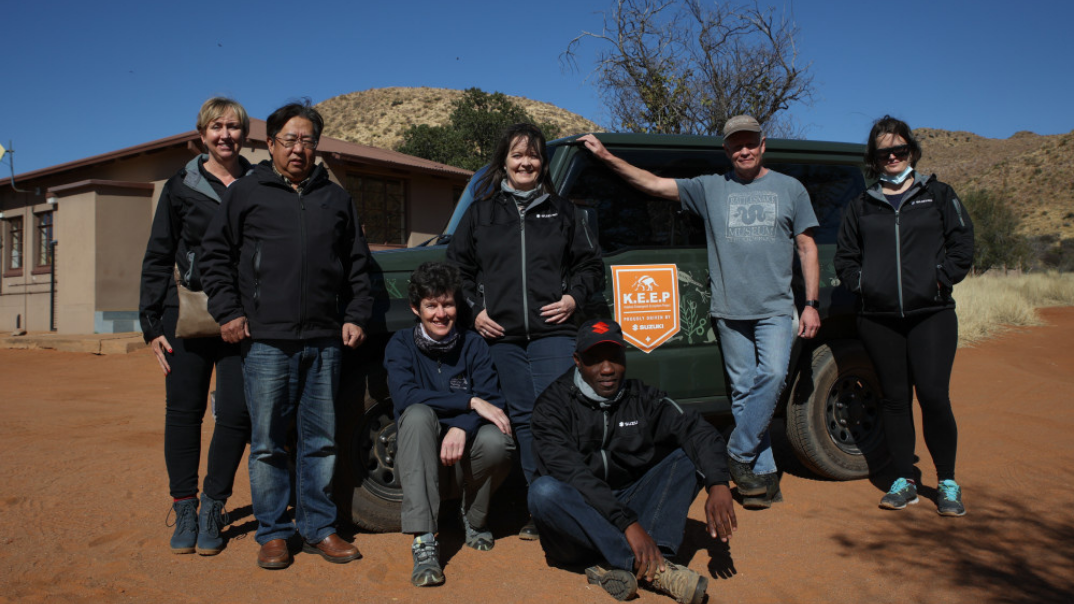 Visit the expansive Tswalu reserve in the Northern Cape and you are bound to see unique species adapted to thrive in this harsh landscape – the sengi, the pygmy falcon, the bat-eared fox and the Suzuki Jimny.
Visit the expansive Tswalu reserve in the Northern Cape and you are bound to see unique species adapted to thrive in this harsh landscape – the sengi, the pygmy falcon, the bat-eared fox and the Suzuki Jimny.
Suzuki Auto South Africa has extended its partnership with the Kalahari Endangered Ecosystem Project (KEEP) with the donation of a Suzuki Jimny for use on the reserve. The company has also announced the permanent donation of the two Suzuki Vitara Allgrip models previously loaned to researchers at KEEP.
Suzuki Auto South Africa has extended its partnership with the Kalahari Endangered Ecosystem Project (KEEP) with the donation of a Suzuki Jimny for use on the reserve. The company has also announced the permanent donation of the two Suzuki Vitara Allgrip models previously loaned to researchers at KEEP.
The Jimny will allow the many researchers to reach parts of the incredibly vast Kalahari that would only be accessible with an off-road vehicle with low-range capabilities.
“The Kalahari is an unforgiving place, with some of the hottest and coldest temperatures on record in South Africa. We decided to add the Jimny to KEEP’s fleet of Vitara Allgrip models as it will comfortably operate in these extremes while allowing researchers to reach areas previously completely out of reach,” says Brendon Carpenter, Brand Marketing Manager for Suzuki Auto South Africa.
The Jimny has already started service on the sandy dunes and rocky outcrops of the Kalahari.
While primarily tasked with transporting scientists to the distant reaches of the reserve, KEEP’s Jimny will also be loaded with sensitive tracking and other scientific equipment. This will help the scientists to study the movement of animals such as the pangolin as it covers great distances in search of food.
KEEP, still only two years old, is an innovative research project headed by Professors Andrea Fuller and Graham Alexander from the University of the Witwatersrand. It is project-managed by Dr Wendy Panaino and supported by the Tswalu Foundation and Oppenheimer Generations Research and Conservation.
The project brings together researchers in fields as diverse as botany, zoology, veterinary science, ecology, and physiology to not only study specific species and their adaptation to climate change but also their wider ecology and food webs.
This ground-breaking approach allows scientists to better understand how species will respond to the extreme conditions brought upon by climate change. The research and multiple datasets collected by KEEP are shared with other researchers across the world to help them better understand changes in their own ecological systems and the very intricate interaction between different species and their environments.
“For example,” explains Dr Panaino, “hotter and drier conditions will reduce grass growth, which will have an impact on the termites that depend on grass for survival, and in turn the animals that eat termites, such as sociable weavers and aardvarks.”
Says Carpenter: “We chose KEEP for the incredibly important work that they do and for the way they embody our values of teamwork for the greater good. We trust that the Jimny, and the Vitara Allgrip models that they now own, will support their important research into climate change in South Africa and their massive contribution to this field for the global scientific community.”
The growing KEEP project includes highly qualified researchers and postgraduate students from across South Africa. Apart from Professors Fuller (large mammals) and Alexander (snakes and other reptiles) and Dr Panaino (a specialist in pangolins), it also includes:
- Professor Marcus Byrne from the University of the Witwatersrand (insects, particularly dung beetles)
- Dr Duncan MacFayden from Oppenheimer Generations Research and Conservation (small mammals)
- Dr Nico Avenant from the National Museum Bloemfontein (small mammals)
- Prof Leith Meyer from the University of Pretoria (large mammals)
- Dr Bryan Maritz and Dr Robin Maritz from the University of the Western Cape (snakes and other reptiles)
- Professor Robert Thompson and Dr Anthony Lowney from the University of Cape Town (birds)
- Professor Leslie Brown, University of South Africa (vegetation changes).
- Mr Dylan Smith, Tswalu Foundation (research management in the reserve).
To add your support to KEEP and the work it does, visit: https://tswalu.com/tswalu-foundation/research/current-research/keep/
Subscribe to our blog and get all our exciting content delivered to you either weekly or monthly.

.png)

